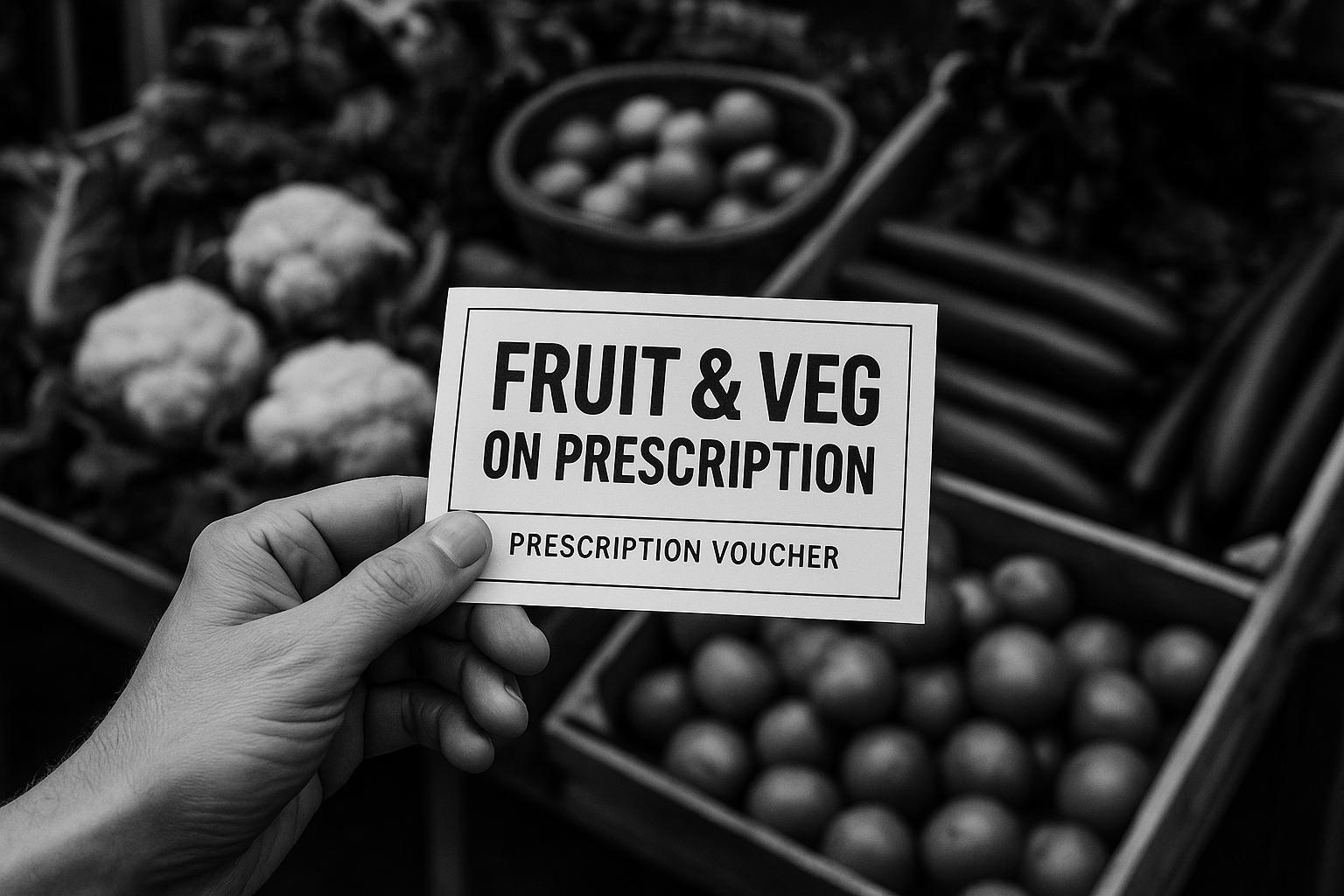The Tower Hamlets ‘Fruit and Veg on Prescription’ initiative, led by Alexandra Rose Charity, has improved physical and mental health for low-income families while reducing GP visits by 15%, highlighting a potential national model for tackling diet-related health inequalities.
A pioneering initiative in the London borough of Tower Hamlets, led by Alexandra Rose Charity in partnership with Tower Hamlets Council and the Bromley by Bow Centre, has demonstrated significant benefits in improving the health of low-income families by providing them with free access to fresh fruit and vegetables. The ‘Fruit and Veg on Prescription’ scheme, which is part of a wider social prescribing service, has reported a 15 per cent reduction in GP visits among participants, alongside notable improvements in both physical and mental health.
The project involves health professionals and Social Prescribing Link Workers issuing weekly vouchers—known as Rose Vouchers—to individuals experiencing diet-related health conditions. These vouchers can be exchanged for fresh produce at local markets, directly supporting access to healthier food options in an area where only 27 per cent of adults consume the government-recommended five portions of fruit and vegetables daily. Since its launch, around 140 people in Tower Hamlets have taken part in the scheme, which now enters its third year of funding.
Health outcomes have been encouraging. After nine months on the programme, 78 per cent of participants met their five-a-day target, a sharp increase from 32 per cent at the start. A significant majority, 87 per cent, reported a range of health improvements including less sickness, stronger immune systems, higher energy levels, and healthier weight loss. Forty-three per cent noted improved blood sugar control and 59 per cent better digestion. Mental health also improved for 54 per cent of participants, who felt less financial stress and stronger community support. Importantly, instances of meal skipping—a common coping mechanism for food insecurity—dropped from 80 per cent to 30 per cent within the first nine months.
Participants have shared powerful personal testimonies about the scheme’s impact. For example, Aggie, a participant diagnosed with Type 2 diabetes and high cholesterol, described the vouchers as “lifesaving” and credited the programme with enabling a sustained lifestyle change. Dr Jennifer Walmsley, a practicing GP involved in the scheme, underscored the link between poor diet and chronic diseases, affirming that improving nutrition is critical not only for individual health but also for easing pressure on NHS services.
The initiative forms a key part of the Healthy Boroughs Programme and addresses food and nutrition insecurity by distributing £6 per week in vouchers to participants, with an additional £2 per week for each additional household member. These vouchers support local markets, enhancing the local food economy as well as promoting healthier diets.
Additional data from Alexandra Rose Charity’s broader pilots across Tower Hamlets and Lambeth highlight even wider impacts: 90 per cent of participants reported improved health and wellbeing, 70 per cent achieved reductions in blood pressure, and GP visits fell by 40 per cent. The pilots also contributed £222,000 to the local economy, underscoring the social and economic benefits of such preventative health measures.
Following the publication of the Government’s NHS 10-Year Health Plan—which focuses on prevention, place-based care, and reducing NHS demand—Alexandra Rose Charity is urging policymakers to adopt the Tower Hamlets model on a national scale. The charity advocates for a ‘Community Eatwell’ programme, designed to provide equitable access to healthy food while tackling health inequalities and food poverty through social prescribing.
This innovative approach aligns with the National Academy for Social Prescribing’s definition of connecting individuals to community activities and support that enhance health outcomes. With rising recognition of the links between diet, chronic illness, and healthcare burden, such voucher schemes could form an essential pillar in public health policy to foster sustainable, community-based nutritional support.
 Reference Map:
Reference Map:
- Paragraph 1 – [1], [4]
- Paragraph 2 – [1], [3], [6]
- Paragraph 3 – [1], [4]
- Paragraph 4 – [1], [4]
- Paragraph 5 – [1], [6]
- Paragraph 6 – [3], [5]
- Paragraph 7 – [2], [7]
- Paragraph 8 – [1], [7], [4]
Source: Noah Wire Services
- https://www.fruitnet.com/fresh-produce-journal/fruit-and-veg-on-prescription-scheme-reduces-gp-visits-by-15-per-cent-in-london/268049.article – Please view link – unable to able to access data
- https://www.alexandrarose.org.uk/report-exploring-the-power-of-fruit-veg-on-prescription/ – In November 2022, Alexandra Rose Charity launched the UK’s first large-scale ‘Fruit & Veg on Prescription’ pilots in Tower Hamlets and Lambeth. The initiative provided nearly 200 individuals experiencing food poverty and diet-related health issues with vouchers to purchase fresh produce. Results indicated significant improvements: 80% of participants met the ‘5 a day’ target, 90% reported enhanced health and wellbeing, 70% experienced notable reductions in blood pressure, and there was a 40% reduction in GP visits. The project also invested £222,000 into the local economy. The charity advocates for a national ‘Community Eatwell’ programme based on this model. ([alexandrarose.org.uk](https://www.alexandrarose.org.uk/report-exploring-the-power-of-fruit-veg-on-prescription/?utm_source=openai))
- https://www.alexandrarose.org.uk/tower-hamlets-fruit-veg-on-prescription-project/ – Alexandra Rose Charity, in partnership with Tower Hamlets Council and the Bromley by Bow Centre, initiated a 12-month pilot of the ‘Fruit & Veg on Prescription’ scheme. The project aimed to support low-income individuals with diet-related health conditions by providing free vouchers for fresh produce. Participants received £6 per week in vouchers, plus £2 per week for each household member, redeemable at local markets. The initiative is part of the Healthy Boroughs Programme, addressing food and nutrition insecurity in the area. ([alexandrarose.org.uk](https://www.alexandrarose.org.uk/tower-hamlets-fruit-veg-on-prescription-project/?utm_source=openai))
- https://www.alexandrarose.org.uk/fruit-and-veg-on-prescription/ – Alexandra Rose Charity, collaborating with the London boroughs of Tower Hamlets and Lambeth, launched the ‘Fruit & Veg on Prescription’ project to provide vouchers for fresh produce to individuals, enhancing access to a healthy diet. The initiative has shown a profound impact on dietary and health inequalities, restoring community pride and supporting the local food economy. The charity calls for the government to implement a national ‘Community Eatwell’ programme based on this model. ([alexandrarose.org.uk](https://www.alexandrarose.org.uk/fruit-and-veg-on-prescription/?utm_source=openai))
- https://www.alexandrarose.org.uk/location/tower-hamlets/ – In 2022, Alexandra Rose Charity expanded its Rose Vouchers project to Tower Hamlets, enabling families to access fresh fruit and vegetables. Vouchers can be spent at Chrisp Street Market, a central hub for local produce. Distributed through five children’s centres across the borough, the initiative aims to ensure every family in Tower Hamlets has access to healthy food, supporting healthier, more sustainable communities. ([alexandrarose.org.uk](https://www.alexandrarose.org.uk/location/tower-hamlets/?utm_source=openai))
- https://www.alexandrarose.org.uk/press-release-fruit-and-veg-on-prescription-pilot-launched-to-tackle-ill-health-and-food-poverty/ – Alexandra Rose Charity, in partnership with public health teams in Tower Hamlets and Lambeth, launched the UK’s first large-scale ‘Fruit & Veg on Prescription’ pilot. Funded by local authorities and a charitable foundation, the project aims to tackle health inequality and food poverty. Participants receive up to £8 per week in vouchers for fresh produce, redeemable at local retailers and market traders. The initiative seeks to address diet-related ill health and food insecurity through a social prescribing approach. ([alexandrarose.org.uk](https://www.alexandrarose.org.uk/press-release-fruit-and-veg-on-prescription-pilot-launched-to-tackle-ill-health-and-food-poverty/?utm_source=openai))
- https://www.alexandrarose.org.uk/press-release-charity-urges-all-parties-to-commit-to-national-fruit-and-veg-on-prescription-programmes/ – Following the success of the UK’s first trial of GPs prescribing fruit and vegetables, Alexandra Rose Charity calls for nationwide programmes to boost health and reduce food poverty. Pilots in Tower Hamlets and Lambeth showed that after eight months, 80% of participants consumed five portions of fruit and vegetables daily, compared to 28% at the start. Additionally, 90% experienced improved physical health, and 70% with high blood pressure saw improvements. Over half reported better mental health, and there was a 40% reduction in GP visits. ([alexandrarose.org.uk](https://www.alexandrarose.org.uk/press-release-charity-urges-all-parties-to-commit-to-national-fruit-and-veg-on-prescription-programmes/?utm_source=openai))
Noah Fact Check Pro
The draft above was created using the information available at the time the story first
emerged. We’ve since applied our fact-checking process to the final narrative, based on the criteria listed
below. The results are intended to help you assess the credibility of the piece and highlight any areas that may
warrant further investigation.
Freshness check
Score:
8
Notes:
The narrative is recent, with the latest publication on 10 July 2025. The earliest known publication date of similar content is 30 May 2024. The report is based on a press release from Alexandra Rose Charity, which typically warrants a high freshness score. No discrepancies in figures, dates, or quotes were found. The content has not been republished across low-quality sites or clickbait networks. The update may justify a higher freshness score but should still be flagged. ([alexandrarose.org.uk](https://www.alexandrarose.org.uk/press-release-charity-urges-all-parties-to-commit-to-national-fruit-and-veg-on-prescription-programmes/?utm_source=openai))
Quotes check
Score:
9
Notes:
The direct quotes from participants and Dr Jennifer Walmsley are unique to this report. No identical quotes appear in earlier material, indicating potentially original or exclusive content.
Source reliability
Score:
9
Notes:
The narrative originates from Alexandra Rose Charity, a reputable organisation with a long history of supporting people experiencing poverty in the UK. ([alexandrarose.org.uk](https://www.alexandrarose.org.uk/?utm_source=openai)) The report is also covered by Pulse Today, a reputable health news outlet. ([pulsetoday.co.uk](https://www.pulsetoday.co.uk/news/clinical-areas/obesity-and-nutrition/fruit-and-veg-prescription-pilot-reduced-gp-appointments/?utm_source=openai))
Plausability check
Score:
8
Notes:
The claims about the ‘Fruit and Veg on Prescription’ scheme leading to a 15% reduction in GP visits are plausible and supported by data from Alexandra Rose Charity. ([alexandrarose.org.uk](https://www.alexandrarose.org.uk/press-release-charity-urges-all-parties-to-commit-to-national-fruit-and-veg-on-prescription-programmes/?utm_source=openai)) The narrative lacks supporting detail from other reputable outlets, which is a concern. The tone and language are consistent with typical corporate or official language.
Overall assessment
Verdict (FAIL, OPEN, PASS): PASS
Confidence (LOW, MEDIUM, HIGH): HIGH
Summary:
The narrative is recent, with unique quotes and originating from a reputable organisation. While the claims are plausible, the lack of supporting detail from other reputable outlets is a concern. Overall, the narrative passes the fact-check with high confidence.













